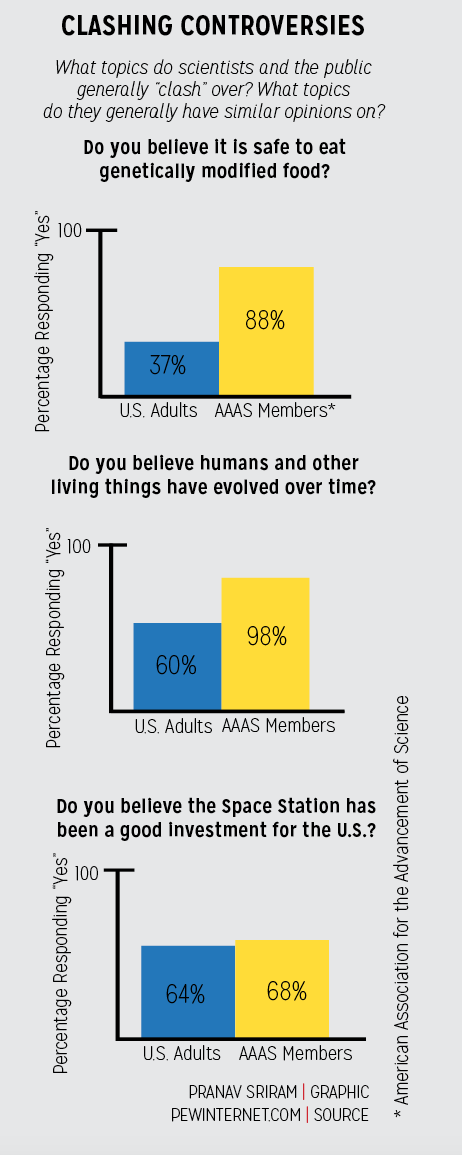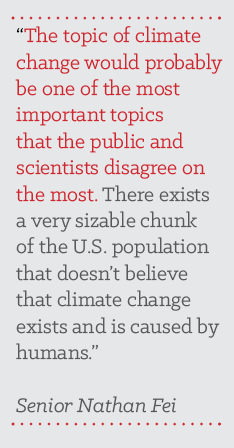Students, teachers have high hopes for U.S. scientific progress, STEM education
BRIDGING THE GAP: Senior Abhinav Ramkumar explores neuron transmission in ATP on his computer for a more computational approach. He said the public considers ethics more than scientists in experiments.
According to a Pew Research study conducted in 2015, the public and scientists often see subjects that highlight U.S. scientific achievements and STEM (Science, Technology, Engineering and Math) education in many ways.
Student researcher and senior Abhinav Ramkumar said U.S. STEM achievement is above average compared to the rest of the world because many scientific developments are contributed by immigrants.
“I believe that the main reason for achievement in STEM is due to the types of students and parents who immigrate and get accepted into top institutions,” Ramkumar said via email.
Science teacher Daniel Marble said he agreed the United States is above average in scientific achievements due to the attraction of research facilities and schools here.
“If you look at science education in the United States, it’s still the top and the best, so people who want to become a scientist or want to do the best research, they’re still pretty much all coming (to the United States). If you go to graduate schools, it’s very full of foreign students trying to learn from us,” Marble said.
Science enthusiast and senior Nathan Fei said it is difficult to rank countries due to strengths in various subjects, but still said he agrees the United States is above average in scientific achievement. However, he said he has other opinions on STEM education.
“From the perspective of the world, the U.S. is above average. However, when only looking at developed countries, the U.S. would probably be less than average in STEM,” Fei said.
According to Pew Research, this view is not unusual. Only 29 percent of the American public thinks the U.S. STEM education is above average in the world. Despite this, Marble said there are both benefits and negatives of American programs.
Marble said, “America is a relatively big country, so there’s a benefit (from that) because there’s all these new things and opportunities that people have. It’s also a drawback because there’s a lot of people who also get left out of scientific progress and the ability to go to schools.”
There are still views on scientific topics that cause conflict between scientists and the public.
Views on scientific topics conflict between scientists, public
A Pew Research study conducted in 2015 showed subjects where research is an important factor have caused controversy among scientists and others. With a difference in large opinion, scientists and the public each often think the other is not as informed. For instance, genetically-modified foods have caused a major dispute in the past. Science teacher Daniel Marble said he thinks the processes scientists use are much more complex than the public thinks.
“(Scientists’) whole understanding of the world is often based upon reason and the fact that you should only form opinions given reasonable information that informs those opinions. If you’re looking at genetically-modified food, if there’s evidence that would suggest that it’s harmful, scientists would be looking for that. There’s that investigation going on, but as far as I know, that hasn’t been found yet,” Marble said.
Science enthusiast and senior Nathan Fei said he agrees with Marble in that the public is generally less informed than scientists responsible for testing and conducting the research.
“People are not as well-informed on the topics of genetically-modified foods. Most people think of genetically-modified foods as ‘frankenfoods’ and become afraid. However, what they don’t realize is that genetically-modified foods go through rigorous testing, and that we already have many strains of genetically-modified crops feeding us today,” Fei said.
Student researcher and senior Abhinav Ramkumar said the public also considers ethics more so than scientists when performing various experiments. This results in disagreements regarding the common research practices.
He said, “Any type of research involving animal or human subjects results in controversy due to ethical and religious considerations of the public and those performing the experiments. As a result, current ethical practices put checks on what researchers can do and cannot do.”
However, the United States are advancing in scientific research in the form of STEM.
